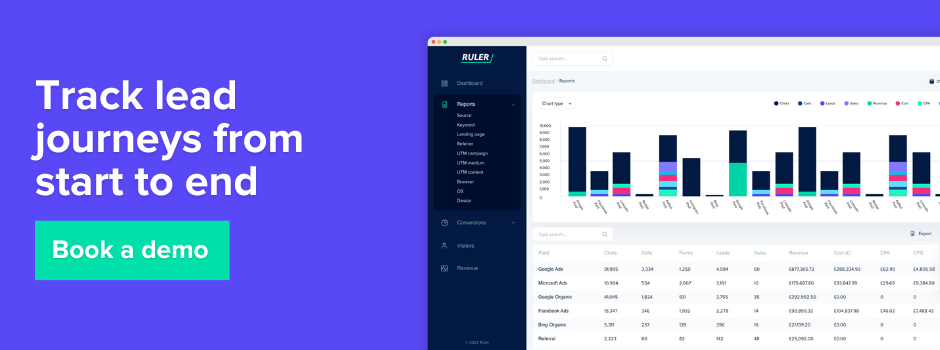Discover marketing trends, stats, averages and benchmark your performance against other businesses in the healthcare industry.
The Internet has played a significant role in distributing health information to millions of people.
Too often, individuals will turn to online sources to receive answers to medical-related questions and find verified, factual information on health conditions and symptoms.
Healthcare practices have recognised the importance of connecting with consumers online and, as a result, are investing more time and money into digital marketing to improve visibility and acquire more patients.
With that in mind, we’ve compiled a list of the best healthcare marketing statistics to help you stay ahead of the competition and avoid investments that don’t add value to your bottom line.
Haven’t got time to read the full blog?
Get a copy of the conversion benchmark report to discover statistics, trends and observations in the healthcare industry and gain key insights to maximise your lead generation performance.
Download the conversion benchmark report for healthcare
Search marketing is one of the most used channels, and it’s continuing to grow year on year. Most healthcare marketers are utilising search to increase their reach and target a specific type of audience looking for a particular treatment or solution.
1. Organic and paid search drives up to 76% of website traffic
Search marketing is one of the most cost-effective ways of generating traffic and awareness for your healthcare practice. (Source: Ruler Analytics)
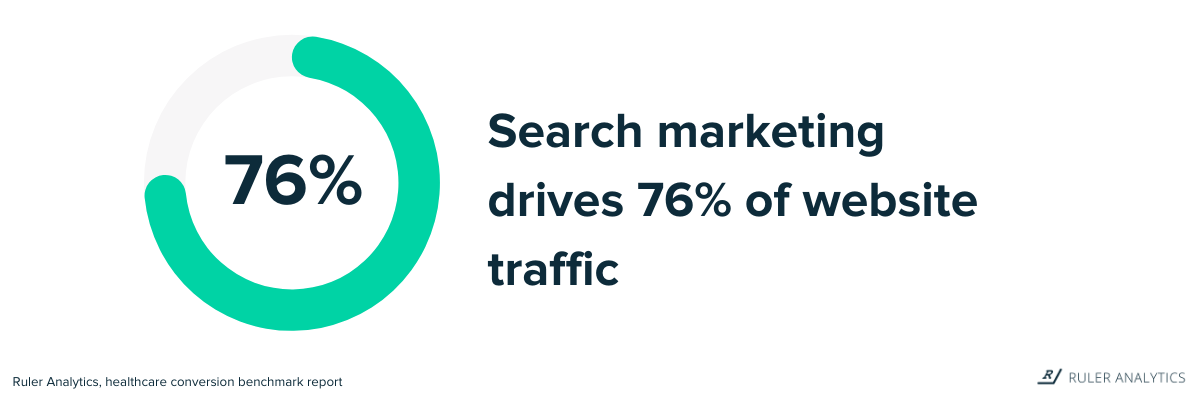
2. 66% of internet users look online for information about a specific disease or medical problem
Organic search is essential for online visibility and is often the first touchpoint in the customer journey. Patients will use Google to receive answers to find what they want or need before reaching out to a healthcare professional. (Source: Pew Research)
3. SEO leads have a 14.6% close rate in converting patients, while outbound leads (such as direct mail or print advertising) have a 1.7% close rate
Acquiring a lead through outbound marketing can be more costly. Today’s users prefer to seek health-related issues themselves by browsing trusted sources. (Search Engine Journal)
4. There are at least 100 billion searches for healthcare on Google alone each year. That’s 273 million healthcare searches a day
Google is a popular source of information for people with health-related questions and symptoms. (Source: Yext)
5. Local convenience is key as “near me” searches for health-related services have doubled since 2015
“Near me” searches have increased dramatically in popularity over the last few years and is a growing trend in the healthcare industry. (Source: Think with Google)
Paid search is key since it is highly targeted and allows marketers to get to the top of Google without having to rely on organic rankings. Healthcare marketers have recognised this as an opportunity, and are leveraging PPC to reach the right type of audience based on their search intent, preferences and even location.
6. Paid Search has an average conversion rate of 5%
PPC allows healthcare marketers to attract the interest of patients who are ready to convert with high intent keywords. (Source: Ruler Analytics)
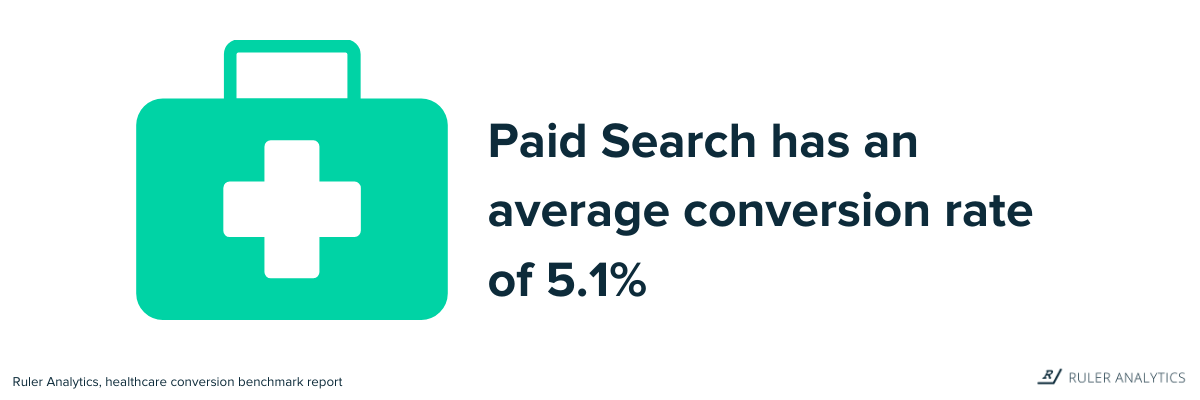
7. Google reports that 63% of searchers make their decisions based on the proximity of a proposed service to their home or office
Location targeting is everything in the healthcare industry. People will rely on Google to find a hospital or medical practice closest to their location. (Source: Google)
8. Digital ad spend in the healthcare sector will continue to grow and surpass 11 billion dollars by the end of 2021
The healthcare industry has been slow to advertise in digital due to previous concerns around patient privacy. That said, today’s patient is much more technically savvy, and healthcare marketers are capitalising on this by investing more money in digital advertising. (Source: Statista)
9. Healthcare advertisers pay an average cost per click of $3.17
The healthcare industry is competitive, and advertisers are constantly battling for ad space. As a consequence , healthcare marketers are paying approx. $3.17 a click to beat out the competition. (Source: Wordstream)
10. The average cost for a healthcare lead is $162
While measuring cost per lead is straightforward and stress-free, it does not serve as a good indicator when measuring the effectiveness of your advertising. While some channels can drive reduced cost per lead values, they often have a higher tendency to generate lower quality leads that don’t equate to anything. With that in mind, healthcare marketers need to go beyond cost per lead values and focus on metrics more meaningful to the organisation, such as revenue per click and lifetime value. (Source: Lead Generation Institute)
💡 Pro Tip
Ruler makes the process of tracking revenue easy. It attributes revenue data from your CRM to your marketing channels, allowing you to go beyond cost per lead metrics to identify the marketing activities that generate the most (and the least) revenue.
Learn how Ruler attributes revenue to your marketing
Word of mouth and referral marketing is a cost-effective way to drive customer acquisition and growth in the healthcare sector. More often than not, people will seek out advice or read reviews before speaking with a healthcare professional. Healthcare marketers must ensure a steady stream of referrals from existing and previous patients to secure long-term growth.
11. Referral has an average conversion rate of 7.2%
We found that referral had a higher conversion rate compared with other marketing channels. (Source: Ruler Analytics)
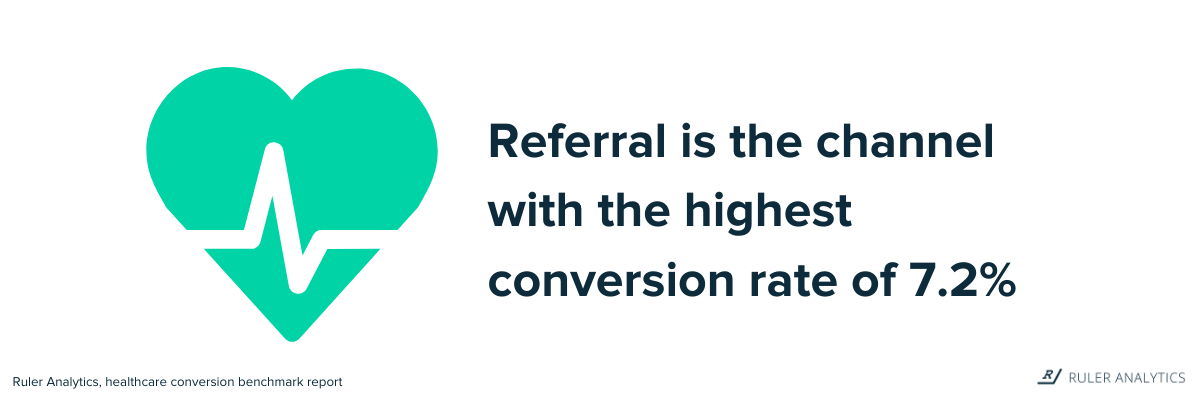
12. 68% of word-of-mouth referral patients cite online reviews as the #1 driver of doctor selection
You may want to encourage previous and existing patients to leave reviews to win over the attention of new audiences. (Source: Pew Research)
13. It only takes 1-6 online reviews for 68% of potential patients to form an opinion about your practice
A negative review can harm your reputation and patient acquisition. Responding and maintaining reviews will help you control how you want people to perceive your business. (Source: RevLocal)
14. 84% of consumers trust reviews as much as personal recommendations
Displaying positive reviews on your website is a great and easy way to attract more patients. (Source: Inc.)
While the journey may start online, many patients do prefer to book appointments and enquire about healthcare services over the phone. Communication between patients and healthcare professionals is often intricate and typically involves an exchange of sensitive and confidential information.
15. We found that 39.2% of conversions happen over the phone
People often want more detailed information on healthcare and treatments. Phone calls ensure better communication and allow patients to get answers to their questions more securely and efficiently. (Source: Ruler Analytics)
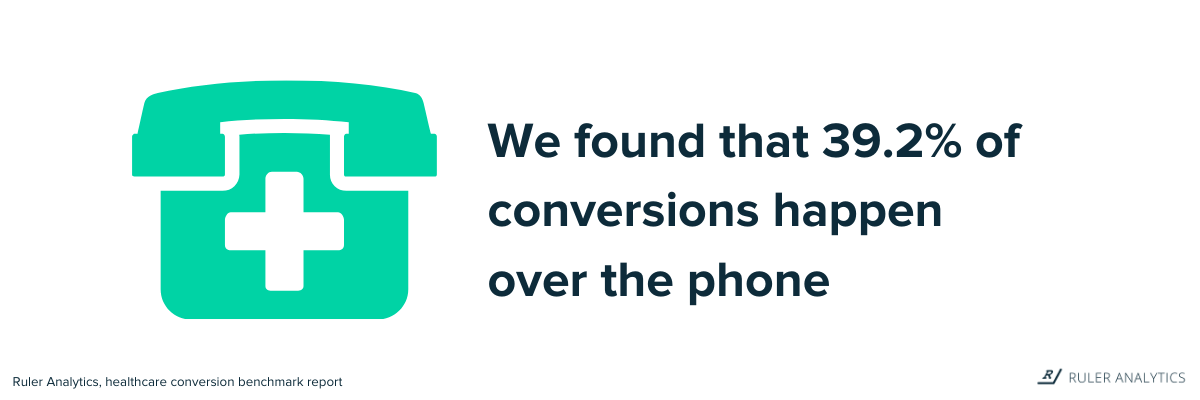
16. 52.3% patients have a higher likelihood of making a phone call after searching on Google
Our data suggests that users are more likely to pick up the phone after making a health-related search on Google. (Source: Ruler Analytics)
17. Only 2.4% of healthcare appointments are scheduled online
While most patients are reluctant to share personal health information via an online form, studies have shown an uptick in millennials scheduling medical appointments using online booking systems. (Source: Accenture)
18. 33% of healthcare providers report having increased phone conversion rates by 25% in the past year
Covid-19 led to an increase in the number of phone consultations and assessments. (Source: Forrester)
We know referral has the highest conversion rate for the healthcare industry, but what about other marketing channels.
19. Healthcare has an overall average conversion rate of 3.2%, but top performers convert up to 21.1%
We sampled the Ruler Analytics database and found that average performers in the healthcare industry turn 3.2% of visitors into qualified leads.
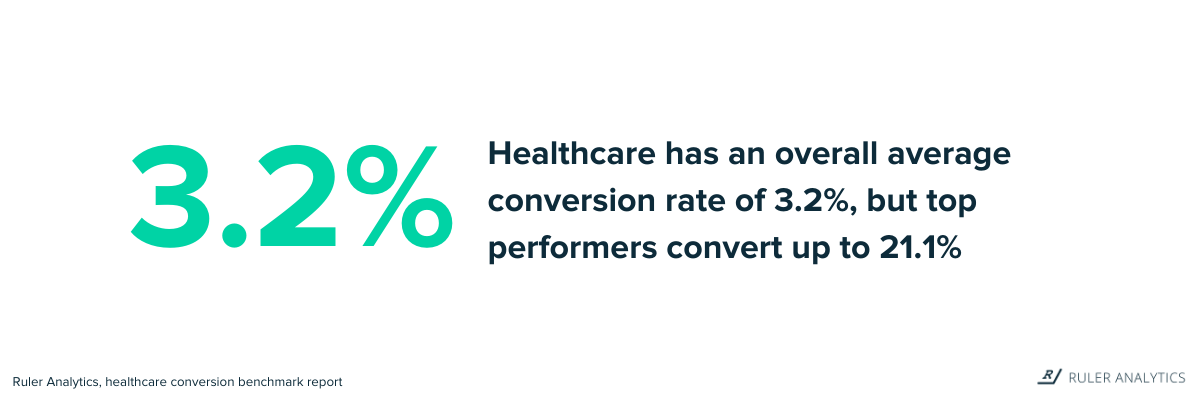
20. Organic search has an average conversion rate of 5.6%
We analysed fourteen industries and found that the overall conversion rate for organic is 5.0%, which means healthcare is slightly above the standard average.
21. Email has an average conversion rate of 5.0%
Email allows healthcare professionals to send appointment reminders, but it’s all a great way to nurture existing patients and acquire new interest.
22. Social organic has an average conversion of 3.0%
While social organic has the lowest conversion rate, it does have its benefits. Social media is a great way to capture the attention of a local audience and is a great place for your patients to share their positive thoughts and experiences.
By now, you should have a better understanding of how you stack up against the competition, but what next? Here is a list of tips to help you get a leg up on the competition.
People looking for healthcare often consider reviews to ensure that they’re putting their well-being and care in the right hands.
Online referrals play a significant role in the customer journey and often lead to offline conversions. With that in mind, marketers in the healthcare industry need to strongly compete for referrals to gain leverage and secure long-term returns.
The best way to drive patients to your local practice is by targeting local keywords. When you optimise for local SEO, your practice will appear higher in local searches like “near me”.
If you have the budget, put some money into PPC to help grow your footprint and drive more targeted traffic.
Inbound phone calls are considered the most valuable marketing conversion. Research from Marketing Sherpa and Hubspot suggests that form fill-out leads only convert to customers about 2% of the time, in contrast to the 25-40% of inbound phone calls to local businesses that turn into customers.
When a lead calls for more information, they’re generally more engaged and have a higher likelihood to commit to your business. Google Ads call extensions is a great way to go for healthcare practices that are looking to increase the number of inbound calls.
Healthcare services are implementing tech to capture and record interactions, boost patient satisfaction and reduce advertising costs.
Modern marketers in the healthcare industry are investing more in attribution software to track cross-channel journeys more cohesively and prioritise budget spend in the right areas.
💡 Pro Tip
Ruler tracks conversions by analysing user journeys. It follows the click path to understand how different touchpoints contribute to lead generation and revenue. When unique identifiers are missing, it employs machine learning to model impressions and connect them to revenue. This enables reattribution and demonstrates the impact of top-of-funnel activities, providing valuable insights into marketing effectiveness.
Book a demo and see Ruler can help
Hopefully, this list of statistics has inspired you to make smarter decisions about how you spend your time and money.
Don’t forget, we have plenty more mind-blowing insights and statistics in our conversion benchmark report for healthcare marketers.
If you’re looking for more information on how Ruler can transform your lead generation strategy, then we’d love to chat. You can book a demo with one of our sales reps to get started.
